NYC’s Forgotten ‘War on Christmas Trees’
Discover how an obscure holiday crackdown affects festive street vendors today!


The new guidebook, New York: Hidden Bars & Restaurants written by Untapped Cities founder Michelle Young and the site’s contributing editor Laura Itzkowitz has just launched. As an update to our popular NYC Bars guide on Untapped Cities, below is our guide for 2015 with descriptions excerpted from the upcoming book.
Upon reviewing the 2015 list, you may wonder where some of the classic hidden bars – Please Don’t Tell, Little Branch, The Back Room, Apotheke – just to name a few. As they have been featured in our previous hidden bars list or our underground bars list, we have aimed for a wider range of experiences on this curation.
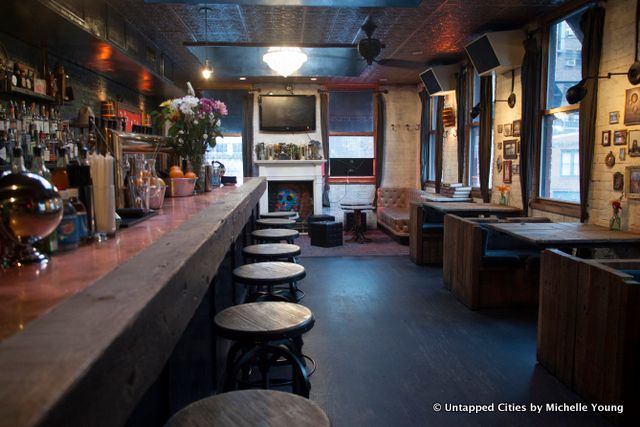
The Garret is one of those bars where the bartenders are like your bandmates or your awesome guy roommates. Hidden above Five Guys burgers in Greenwich Village, you have to walk to the very back of the fast food joint and up a wooden staircase. It’s the type of spot where you can start day drinking at 2pm on Saturdays, order a can of Tecate and a shot, and bring up burgers and fries from downstairs. But there are also the impressive creative cocktails with names like “Seriously Ain’t Fancy” and “Sunken Santa.” It has a laid back cool that you’d find in a dive bar anywhere around the country, with just the right amount of curation in the decor to have personality without pretension.
For those looking for exclusive gems, there are Five Guys burgers you can order that aren’t available at any other location, like The Garret Burger using Peter Luger sauce, the Italian Neighbors burger with Ottomanelli Bros. prosciutto, and the Sixth Man Burger with sriracha.
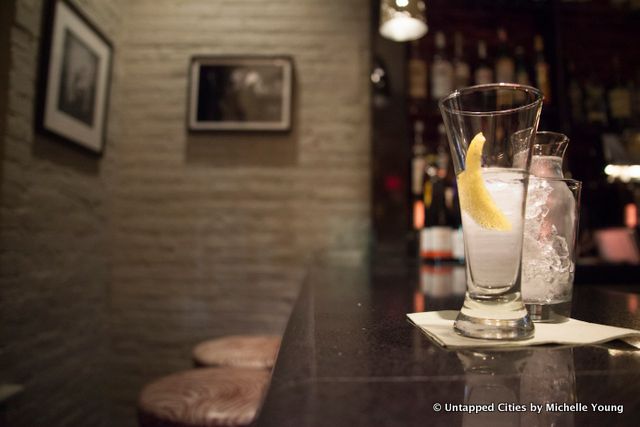
Up a flight of steps and behind a nondescript townhouse door in midtown, Bar Centrale feels a world away from the hustle and bustle of the Theater District. Outside, chaos reigns, but inside, the bar is a safe haven. Broadway actors come here for a nightcap after their shows, knowing they can count on the staff’s discretion. It’s glamorous, but not showy; a bit retro, but not put-on. The whole place has an air of mystery—you never know who you might see.
The menu is equally distinguished but unfussy. There’s wine, beer, and classic cocktails for people who don’t need to look at a menu, but just order their Tanqueray Martini with a twist because that’s how they always take their Martinis. Ask for one and the bartender will serve it in a small glass, with a mini carafe that keeps the rest of your drink on ice, so you never have to go through the agony of imbibing a warm cocktail. Bar fare includes classics like oysters, shrimp cocktails, and caviar, plus lobster quesadillas, vegetarian samosas, and Chinese dumplings.
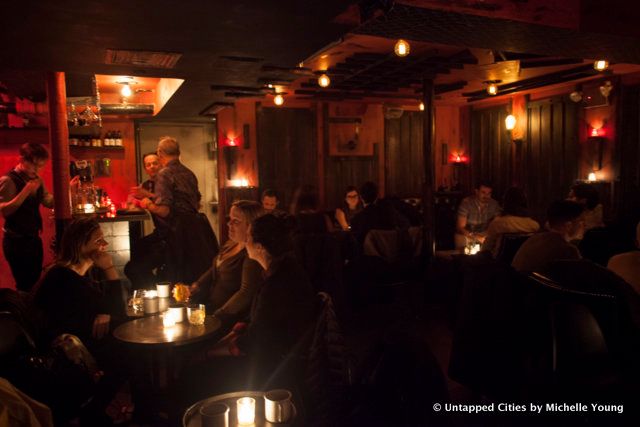
On 1st Avenue in the the East Village, you might notice a sign that says Dead Drop with an arrow that seems to point to nowhere. To access the bar, you have to walk into North River first, then head down the staircase. Press a doorbell, and await further instructions.
The red-tinged basement space has the dark overtones of Cold War espionage and a simultaneously mysterious yet cozy industrial vibe. Water is served in tin cups, tables are actually chests made from the aluminum of airplanes. Old telephones and cameras are tucked into corners throughout, a morse code tap hangs nonchalantly next to the bar.
The cocktail menu at Dead Drop is arranged in espionage-themed categories like “Yet to be Classified,” with non-traditional ingredients and “Recently Declassified,” which are new creations with classic foundations. The cocktails were devised by Colby Zito who comes from the culinary side of things, formerly from Eleven Madison Park and Maialino. There’s a little bit of food too, like all Black Burger and fries with sea urchin mayonnaise. As a last bit of fun, the bill comes embedded in a real book.

Inside the landmarked 69th Regiment Armory, an active armory on Lexington Avenue and 25th Street is The Garryowen, a bar that began as an officers club but is now welcome to military personnel and their guests. The wood-paneled bar, named after the regiment’s marching tunes, has a marble fireplace is flanked with massive artillery, walls of personalized beer steins, and a relic of the World Trade Center. One of their biggest days at the bar is St. Patrick’s Day where upwards of 400 to 500 people come by. Despite the rowdiness, we’re told only one person has ever been banned from the bar (for life). Serving up beers on tap and standard cocktails, the real experience in visiting The Garryowen is about the stories you’ll hear.
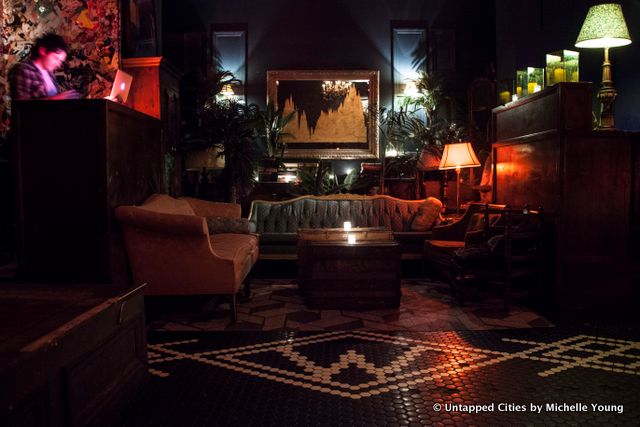
The Wooly, a bar and event space hidden in the first floor of the landmarked Woolworth Building is as much a testament to the creative spirit of New York City today as the building is a celebration of the technical prowess of the skyscraper era.
The Wooly is run by a brother-in-law duo whose personal collection of vintage items collected from all over the country spills over into the bar they run. With chabby chic couches, old books, stacks of vintage suitcases, a pipe organ, old radios, chandeliers and authentic period wallpaper, it’s got the makings of a Wes Anderson set, but better because you get to party in it
To be clear, The Wooly isn’t open like a regular bar. The owners joke that they’ve been “not open since 2009.” For the most part, the space hosts events, parties, and creative panel discussions. But this doesn’t mean that the ordinary layperson can’t get in. If you send an email through their website saying you’ll be in town, and they happen to be open, they’ll gladly accommodate you. Even for a group of two.
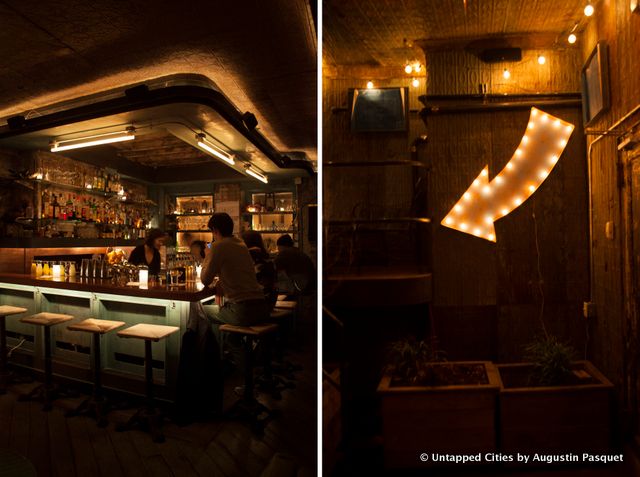
On the border of East Williamsburg and Bushwick, Featherweight is marked only by a small framed image of a white feather on a black door—recently added because the bar was so hidden people looking for it kept walking past it. You get to Featherweight by going through the restaurant Sweet Science next door, but first you have to go through a dimly lit alley—closed off at some point in the building’s history.
Featherweight is just one little room with a bar, three roomy mint-green booths, and some additional seating along the back wall and perched against a column. It’s warm and inviting, though, with weathered tin on the walls and ceiling—found upstairs and installed here—exposed brick, dark wood, and a black velvet curtain guarding the entrance.
These guys take their cocktails seriously. Protegés of the late Sasha Petraske, they follow the Milk & Honey school. The menu is composed of all original cocktails offering inventive spins on the classics, like the Dirty Harry—a dirty Martini variation made with gin, house-infused olive brine, dry vermouth, and cracked black pepper. Homemade syrups enhance many of their drinks.
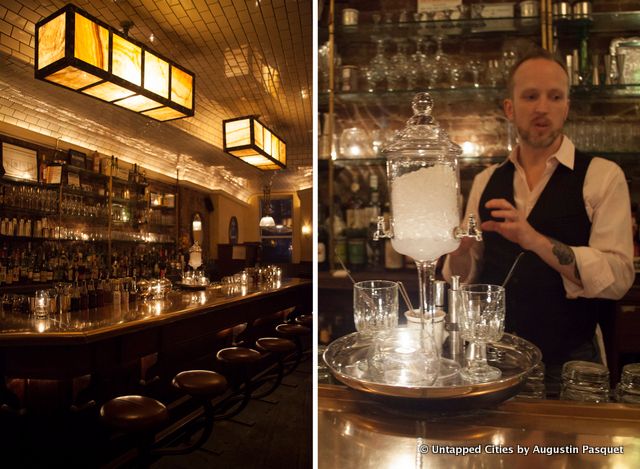
If not for the gleaming white subway tiles covering the façade, you might never even wonder what’s behind the door of this little place on busy Vanderbilt Avenue in Prospect Heights. Venture inside, past the velvet curtain, and you’ll find yourself in a glowing little jewel box of a bar. Amazingly, the white subway tiles continue on the inside, completely covering the ceiling, just like in the Paris métro. Sasha Petraske trained the staff at Weather Up, and it shows. Behind the bar, oranges, lemons, and limes sit in wire baskets, waiting to be pressed and blended with spirits and amaros. The short but sweet cocktail menu contains ten drinks—takes on on the classics—but Weather Up’s bartenders have the full repertoire of classic cocktails in their heads.
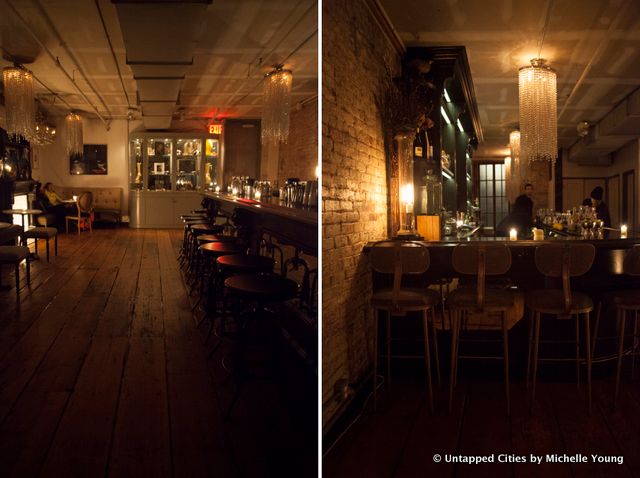
To get to Fig. 19—short for Figure 19 like in science books—you have to walk through an art gallery above the popular subterranean dance spot Home Sweet Home and open up the door in the very back. Once you’re inside, it feels like home. That’s because Fig. 19 was first created by the owners of Home Sweet Home as a clubhouse for them and the staff to hang out. As such, Fig. 19, has managed to keep away the sceney crowds of New York City by remaining chill and true to its roots, with art curated by the friends of the owners and artisanal cocktails that change just slightly with the season. Everything inside is decorated with the warmth and coziness of a New York City apartment parlor, with the building’s original wood plank floor and exposed brick wall.
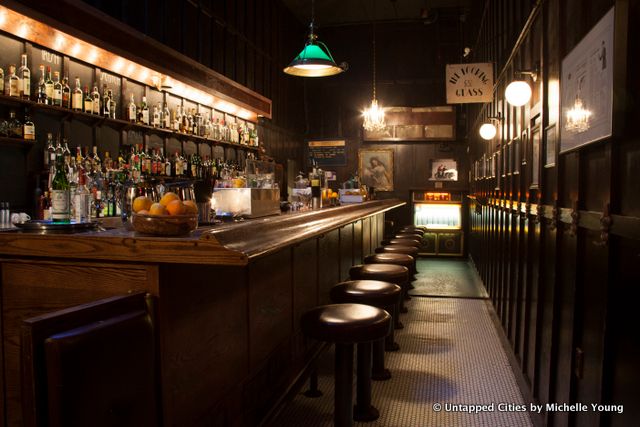
In a non-descript two floor brick building between a transmission shop and a taxi lot, Dutch Kills is an unmarked gem, save for a neon BAR sign. This bar, opened in 2009, predated much of the gentrification taking place, distinguishing itself from other speakeasies through its comprehensive liquor selection and use of fresh ingredients, with a cocktail menu that appeals to those that enjoy spirits.
The vibe at Dutch Kills has always been deliberately divey and fun, functioning simultaneously as a neighborhood bar for residents and a destination for others. The drink menu offers cocktails directly descended from New York City classics from the 1880s to the 1940s. There’s a great offering of hot drinks too, including Hot Toddy, Irish Coffee and Mulled Cider. Dutch Kills bartenders can also make drinks based on your preferences or for the curious, let them do their magic.
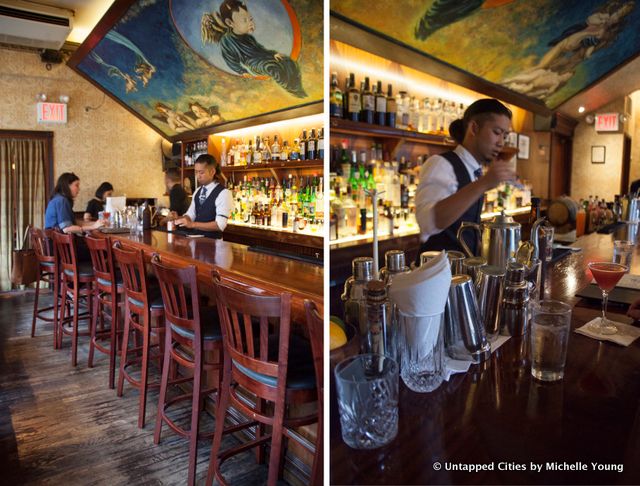
First the rules: no reservations, no groups larger than four, no standing room, and no yelling. Ascend the stairs and enter through the unmarked door to the left of the sushi counter in Yokocho restaurant. If there’s a bit of a wait, be patient. The cocktails here are worth waiting for.
If the rules make you think this place is stuffy, think again. They were instated by the Japanese-born owner, who prefers to go unnamed. He came here to study, but missed the quiet bars back home, where people can actually hear each other talk. When he couldn’t find any, he decided to open one of his own. That was over twenty years ago, and Angel’s Share has remained one of the more obscure speakeasies to this day. The lack of a website and a dearth of press has kept the bar shrouded in mystery.
Take your time with the menu, and don’t be afraid to ask for a recommendation or an explanation. Angel’s Share has some of the most unique cocktails in the city, thanks to the house-made infusions.
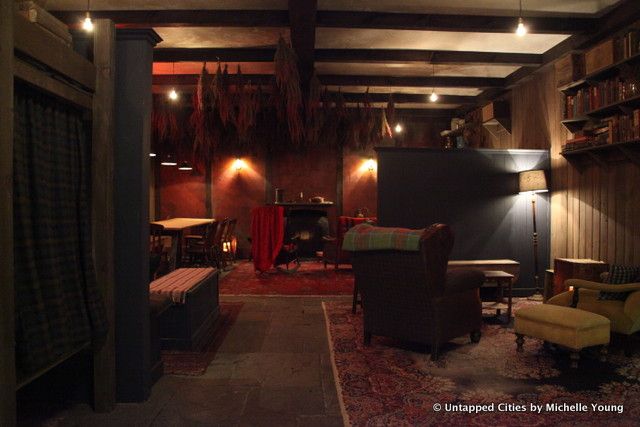
In the winter, Gallow Green rooftop bar at the McKittrick Hotel is transformed into The Lodge. The warm, cozy space is modeled on Scottish bothies—bare-bones cabins up in the hills where people can camp out for free provided they leave something useful behind for the next guest. Completely surrounded by pine trees, The Lodge takes you mind and body out of New York City. Like Sleep No More, it’s nothing less than a theatrical experience with every single detail thought through, even the layer of dust that sat on the mantle on opening night.
The cabin has a few distinctive seating areas, made up of groupings of worn leather club chairs, cushioned benches, and a rocking chair draped with a blanket in front of the fireplace. There’s a long communal table, bunk beds outfitted with hot water bottles and plaid blankets, and a separate bedroom with a writer’s desk and shelves lined with antique leather bound books.
There is, of course, a bar, tucked into the corner near an old porcelain washbasin. Grab a hot drink, like a steaming mug of mulled wine or a camping cup of rye-spiked cinnamon cider, and settle in. And don’t miss the fire on the outdoor patio or the tent filled (and we mean filled) with sheep skins in a remote corner of the forest. See more photos of The Lodge here.
Next, look back on our previous Top 10 Hidden Bars of NYC Guide for some of the classics, along with a guide to bars that are literally underground.
Subscribe to our newsletter